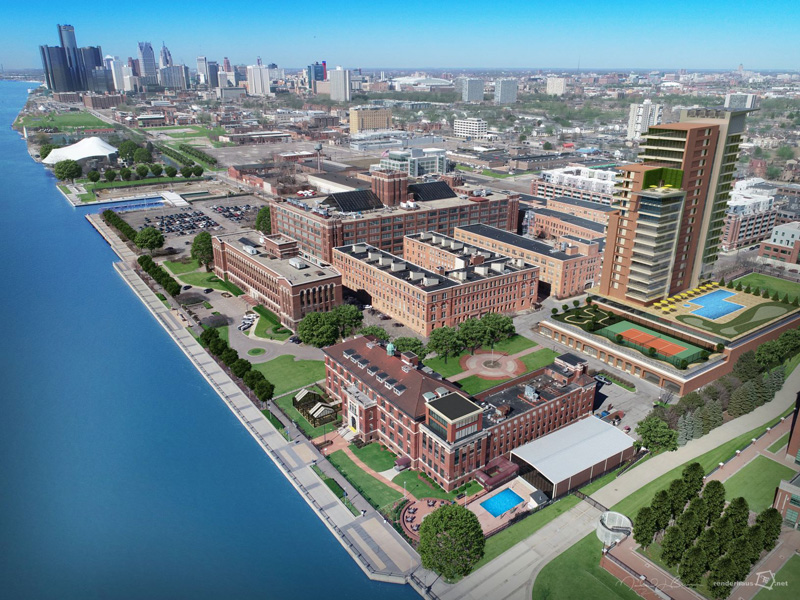
The historic Roberts Riverwalk Hotel, located at 1000 River Place Drive, has been listed as a re-development joint venture or as a sale to a new developer by Newmark Group Inc., a large commercial real estate firm with local offices in Farmington Hills and Southfield.
The 108-room, 112,000-square-foot hotel is set along 290 feet of the Detroit RiverWalk and is within walking distance of downtown Detroit. The structure, constructed in two phases (1873 and 1902), was originally Building 55-Detroit Research and was part of the Parke Davis Research Laboratory (much of which today is Stroh River Place).
Located on 3.74 acres, the hotel property offers additional developable acreage of land that can be redeveloped for a mixed-use or multifamily midrise or high-rise. Newmark Senior Managing Directors Larry Emmons and Patrick Shannon are representing the seller, Roberts Hotels Detroit, in the listing.
In 2010, Roberts Hotels Detroit acquired the building, implemented necessary renovations for full operationality, and renamed the property The Roberts Riverwalk Hotel. Michael V. Roberts, a large mixed-use redeveloper in St. Louis, a residential developer in The Bahamas, and one of the largest minority hotel chain owners in the country, owns the hotel.
The lodge features three meeting rooms, a restaurant, lounge, and bar, and a 5,500-square-foot multi-service facility used for banquet and meeting purposes. The building recently utilized the PACE Program, which promotes energy efficiency-related improvements and is secured by an annual special assessment on the property.
The scope of work included upgrades to the HVAC system, building lighting system, building control system, building envelope, stormwater system, and plumbing system. The Roberts Riverwalk Hotel is believed to be the only green hotel in Detroit.
“The prospect to acquire an established landmark along with coveted waterfront land is rare, and equally compelling is the opportunity zone with unlimited potential to create maximum value for an investor or developer,” says Emmons.
The hotel is in the heart of The Detroit RiverFront Conservancy’s $200 million Riverfront District investment. Part of the East Riverfront District, the immediate area includes the new Atwater Beach and the renovation of Chene Park (now Aretha Franklin Amphitheatre), a 6,000-person capacity amphitheater. In addition, the District is receiving connective greenways, enhanced streetscapes, and architecturally significant developments.
Together with London-based partner Knight Frank and independently owned offices, Newmark has 18,800 employees working at approximately 500 offices around the world. In 2019, Newmark generated more than $2.2 billion in revenue.
Historical note on Parke Davis: From the book, “Detroit: Engine of America,” available at DetroitEngineofAmerica.com.
“In 1867, Dr. Samuel P. Duffield, Hervey C. Parke, and George S. Davis formed Duffield, Parke, and Co. to produce pharmaceutical drugs. The first laboratory was at Henry Street and Cass Avenue. Two years later, Dr. August F. Jennings took over for Duffield, and the company was renamed Parke, Jennings, and Co. Soon after, Jennings retired and two partners were added — William H. Stevens and John R. Grout — and the company was renamed Parke, Davis, and Co.
“The company expanded rapidly, and in 1870, it moved to Jos. Campau at the river. There, more than 2,700 workers were employed in the production of pharmaceutical products, chemicals, digestive ferments, capsule and gelatin products, pressed herbs, vaccines, serums, antitoxins, and oils. Raw materials consisting of bark, leaves, flowers, and roots were sourced globally and used to produce 450 different fluid extracts, 100 solid extracts, 600 varieties of sugar and gelatin coated pills, along with an array of elixirs, wines, syrups, and cerates. …”
Parke Davis, via a series of mergers and buyouts, was folded into Pfizer in 2000.





